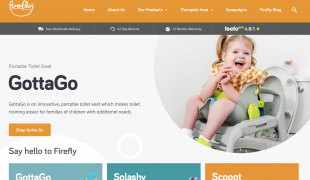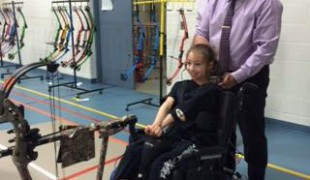- 8245
- 545
- 8
- 3
- 0
- Help Ukraine
About the solution
Caroline’s Cart is a shopping cart created for special needs children. It provides parents and caregivers a viable option to transport a child through a store while grocery shopping, without having the impossible task of having to maneuver a wheelchair and a traditional grocery cart at the same time. It is named after Caroline, the special needs daughter of Drew Ann and David Long.
这些解决方案不应包括使用药物,化学品或生物制品(包括食品);创伤性设备;冒犯性的,商业或内在危险的内容。该解决方案未经医学验证。请谨慎进行!如果您有任何疑问,请咨询健康专家。
DISCLAIMER: This story was written by someone who is not the author of the solution, therefore please be advised that, although it was written with the utmost respect for the innovation and the innovator, there can be some incorrect statements. If you find any errors please contact the patient Innovation team via info@patient-innovation.com
-
-
818
-
0
-
17795

Proloquo2Go – App to help people communicate
CAREGIVING
COMMUNICATION: Communicating, whether by speaking, listening, or other means
Social interaction
Paralysis
Autism
Cerebral Palsy
Brain Stroke
Brain Injury (Abscess, Brain Barrier Defect, Brain Contusion, Brain Hemorrhage, Brain Edema)
Assistive Daily Life Device (to help ADL)
Assistive Technology access
App (Including when connected with wearable)
Tremors
Muscle cramps or spasms
Difficulty coordinating movements
Muscle weakness
Difficulty speaking or understanding speech
Trouble with fine motor skills (e.g., writing, buttoning clothes)
Twitching or involuntary movements (myoclonus)
Acquired language impairment (Aphasia)
Promoting self-management
Managing Neurological Disorders
Building Supportive Community Relationships
Promoting inclusivity and social integration
Improving Speech and Communication
Caregiving Support
Clinical Pathology
Medical Genetics
Neurology
Pediatrics
Rheumatology
Netherlands
-
-
-
286
-
0
-
3068

Collaborator James Leckey makes equipment to improve the quality of life and social inclusion of children with special needs
MOVING IN A WHEELCHAIR: Moving using a wheelchair.
BODY BALANCE: Maintaining body balance
STANDING UP: Standing up from a seated position
Playing
Neuromuscular Disorders
Assistive Daily Life Device (to help ADL)
Walking Aid (wheelchair/walker/crutches)
Assistive Technology access
5 Senses support devices: (glasses, hearing aids, headphones...)
Restoring mobility
Promoting self-management
Managing Neurological Disorders
Promoting inclusivity and social integration
Maintaining Balance and Mobility
Raise awareness
General and Family Medicine
Neurology
Orthopedics
Pediatrics
Physical Medicine and Rehabilitation
United States
-
-
-
644
-
0
-
8581

Father creates gadgets adapted for people with cerebral palsy
MOVING IN A WHEELCHAIR: Moving using a wheelchair.
Playing
Gardening
Social interaction
Cerebral Palsy
Educational/Leisure device (book, toy, game...)
Assistive Daily Life Device (to help ADL)
Muscle cramps or spasms
Difficulty coordinating movements
Trouble with fine motor skills (e.g., writing, buttoning clothes)
Twitching or involuntary movements (myoclonus)
Fatigue
Restoring mobility
Promoting self-management
Managing Neurological Disorders
Promoting inclusivity and social integration
Caregiving Support
Neurology
Pediatrics
Physical Medicine and Rehabilitation
Canada
-
 zh
zh